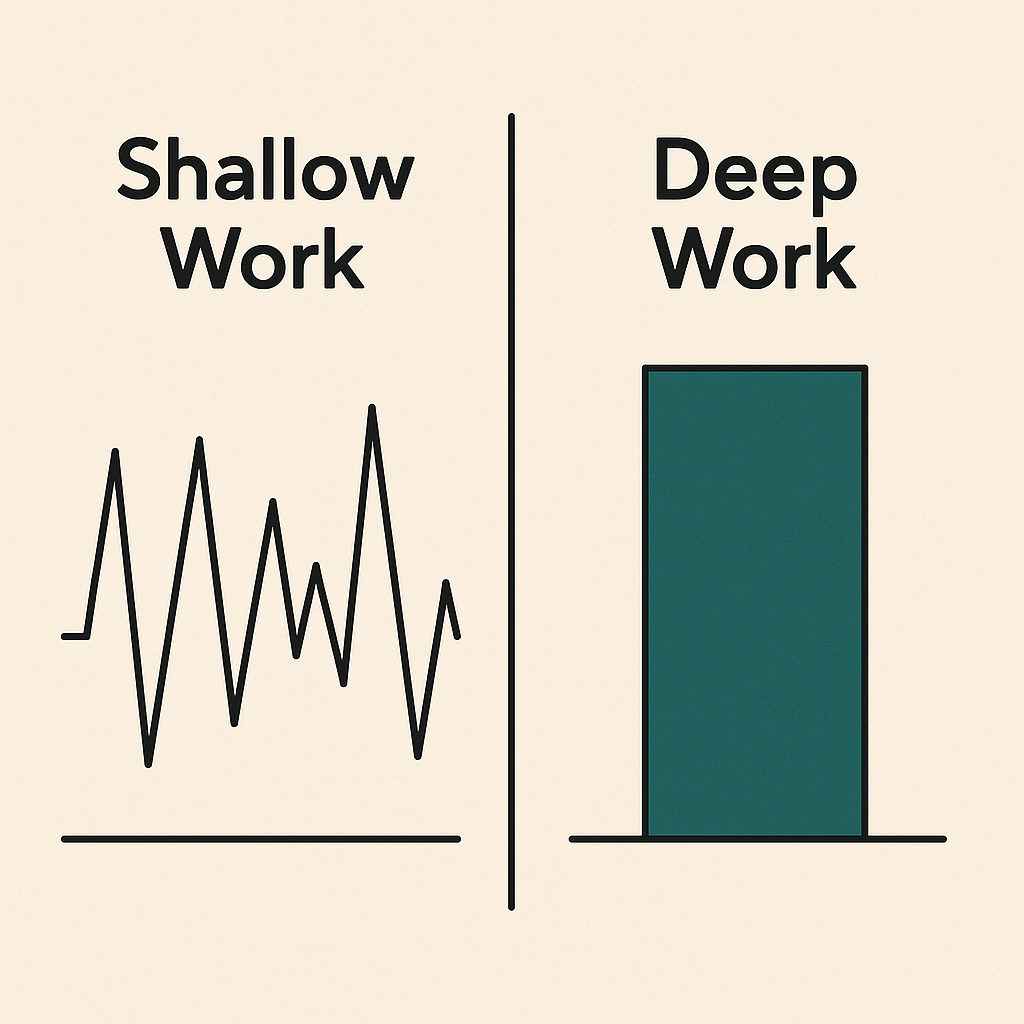Check your email. Respond to a Slack message. Glance at a phone notification. Open a new tab to “quickly” look something up. Check your email again.
Sound familiar? This is the daily reality for most of us. We live in a state of fractured attention, flitting from one low-value task to another, feeling busy but not productive. At the end of the day, we’re exhausted, but we have little to show for it beyond a cleared-out inbox.
But there is another way. It’s a mode of working that feels less frantic and more fulfilling, and produces dramatically better results. It’s a skill that is becoming increasingly rare and, therefore, increasingly valuable.
It’s called Deep Work. And in the age of distraction, it’s a modern-day superpower. This guide will teach you how to cultivate it.
What is Deep Work (and Its Enemy, Shallow Work)?
The term was coined by author and computer science professor Cal Newport in his groundbreaking book, Deep Work: Rules for Focused Success in a Distracted World. He defines the two modes of work as follows:
Deep Work: Professional activities performed in a state of distraction-free concentration that push your cognitive capabilities to their limit. These efforts create new value, improve your skill, and are hard to replicate.
Shallow Work: Non-cognitively demanding, logistical-style tasks, often performed while distracted. These efforts tend to not create much new value in the world and are easy to replicate.
Think of it this way:
- Deep Work is: Writing a strategic report, learning a new complex skill, coding a difficult feature, or developing a business plan.
- Shallow Work is: Answering most emails, scheduling meetings, responding to Slack pings, or scrolling through social media for “work.”
The problem is that our modern work environment is engineered to keep us in a constant state of shallowness. The ping, the buzz, the endless stream of notifications—they all give us a tiny hit of dopamine and a feeling of being busy, while robbing us of the focus required to do what truly matters.
Why Deep Work is a Skill You Can’t Afford to Ignore
Cultivating a deep work habit isn’t just about “being more productive.” It’s about fundamentally changing the quality and impact of your output. The benefits are threefold:
- You Learn Hard Things Faster: To master any complex skill—be it a new programming language, a musical instrument, or a marketing strategy—you need intense, uninterrupted focus. Deep work creates the optimal neurological conditions for rapid learning.
- You Produce Elite-Level Work: Quality work is a product of focused intensity over time. A single, two-hour deep work session can produce a better result than eight hours of fragmented, shallow work.
- It’s Deeply Fulfilling: Contrary to what you might think, a state of deep focus is incredibly rewarding. It’s the state of “flow” that psychologists talk about, where you are so absorbed in a task that the outside world melts away. This is far more satisfying than the anxious buzz of constant connectivity.

How to Cultivate Your Deep Work Habit: 4 Core Strategies
Deep work is a skill, and like any skill, it requires training. Here are four practical strategies, inspired by Newport’s work, to build your focus muscle.
1. Choose Your Deep Work Philosophy
You need to decide how you will schedule deep work into your life. There is no one-size-fits-all approach.
- The Monastic Philosophy: You drastically minimize or eliminate shallow obligations. Think of a writer who moves to a cabin in the woods to write a novel. (Extreme and not practical for most).
- The Bimodal Philosophy: You divide your time into clear, distinct chunks. For example, you might dedicate four full days a week to deep work, and one day to all the shallow stuff. Or you might take a “work-cation” for a week every quarter.
- The Rhythmic Philosophy (Most Popular): You make deep work a simple, regular habit. The goal is to create a rhythm. For example, “I will do a 90-minute deep work session every morning from 8:00 AM to 9:30 AM, no exceptions.” This is often the easiest to start with.
- The Journalistic Philosophy: You fit deep work in wherever you can. This requires an almost elite level of focus and is difficult for beginners. If you have an unexpected free hour, you switch into deep work mode immediately.
Action Step: Choose the Rhythmic philosophy to start. Block out a 60-90 minute recurring session in your calendar 3-5 times a week.
2. Build Your Rituals
Your brain loves cues. A strong ritual tells your brain, “It’s time to focus now.” This reduces the friction of starting. Your ritual should specify:
- Where: Choose a specific location only for deep work (a certain chair, a library, a coffee shop, a specific room in your house).
- For How Long: Decide the length of the session in advance (e.g., 90 minutes).
- How You’ll Work: Define the rules. No phone. No email tab open. What will you do if you get stuck?
- How You’ll Support Yourself: Do you need a specific drink (coffee, tea)? A specific type of music (or silence)? Have everything you need ready before you start.
A simple ritual could be: Clear desk, put phone in another room, start a pot of coffee, open a single document, and set a timer for 75 minutes.
3. Ruthlessly Eliminate Distractions
Deep work cannot coexist with distraction. You must be aggressive in protecting your focus bubble.
- Go Offline: The easiest win. During a deep work session, turn off your Wi-Fi or use an app like Freedom to block distracting websites and apps.
- Silence Your Phone (and Put it Away): Don’t just put it on silent. Put it in another room. Research shows that the mere presence of your smartphone, even if it’s off, reduces your available cognitive capacity.
- Use “Do Not Disturb” Mode: Set your Slack status, close your office door, and put on noise-canceling headphones. Signal to your colleagues (and yourself) that you are unavailable.
4. Embrace Boredom
Our brains have been trained to seek instant novelty the second we feel a hint of boredom. We can’t sit at a red light without checking our phone. This erodes our ability to focus.
You must retrain your focus muscle by practicing being bored.
- When waiting in line, don’t pull out your phone. Just wait. Look around.
- Go for a walk without listening to a podcast or music.
- Try to work through a problem in your head without immediately “Googling” the answer.
This practice will make it much easier to resist distractions when you’re in a deep work session.
Frequently Asked Questions (FAQ)
Q: My job is all about collaboration and answering emails. How can I do deep work?
A: It’s a common challenge. Start small. Can you block 30-60 minutes first thing in the morning before the flood of messages begins? Can you schedule “office hours” where you’re available, and communicate that you will be unreachable outside of those times? Even small blocks of deep work are better than none.
Q: What if I get distracted during a deep work session?
A: It will happen. Don’t beat yourself up. The goal isn’t perfection. Simply notice the distraction, acknowledge it without judgment, and gently bring your focus back to the task at hand. Every time you do this, you are strengthening your focus muscle.
Q: How long does it take to get good at deep work?
A: It’s a lifelong practice, but you’ll notice benefits within a few weeks of consistent effort. Your ability to sustain focus will gradually increase from 20-30 minutes to 90 minutes or even longer sessions. Be patient with yourself.
Your First Deep Work Session Starts Now
The ability to focus deeply is not a gift you’re born with; it’s a skill you build. In a world that is pulling your attention in a million different directions, choosing to cultivate this skill is a radical act of self-investment.
You don’t need to change your entire life tomorrow. Just start with one, small, protected block of time.

